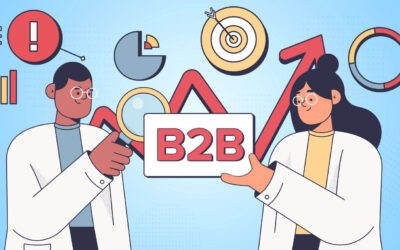Dangerous Affiliate Marketing Scams to Avoid
Affiliate marketing scams are on the rise. To protect yourself, you need to know how these scams work. Here’s what you need to know.

Affiliate marketing has evolved beyond just referral links on blogs—it now includes brand ambassadors, affiliate networks, and influencers on social media platforms like TikTok and Instagram.
Affiliate marketing is a powerhouse that connects businesses with extensive networks of marketers and publishers.
The numbers speak for themselves: According to a study by Influencer Marketing Hub, global spending on affiliate marketing is projected to reach a staggering $14.3 billion by 2023, and this figure is expected to climb even higher to $15.7 billion in 2024.
Legitimate affiliate marketing can skyrocket your sales and brand awareness. But there’s a dark side to be aware of too.
As the affiliate marketing industry grows, so does the opportunity for unethical affiliates and dangerous digital marketing scams that can turn your business upside down. In this article, we’ll cover affiliate marketing scams you need to watch out for and how you can build secure partnerships.
What is an Affiliate Marketing Scam?
An affiliate marketing scam is a deceptive practice where individuals or companies exploit an affiliate marketing system to earn undeserved profits.
Scammers use dishonest tactics to achieve their goals, often at the expense of unsuspecting customers, legitimate affiliates, and the reputation of the businesses involved. These deceptive practices can take various forms, from creating fake clicks and leads to using unethical advertising methods.
Why are Scams on the Rise?
It’s simple: as affiliate marketing grows, so does the desire to tap into its passive income through nefarious means.
Case in point: a study by CHEQ found that 17% of traffic coming from affiliate programs was fake, which lost the industry approximately $3.4 billion to ad fraud in 2022. This number has almost doubled from 2020, when 10% of the traffic was fraudulent.
Today, marketers use affiliate programs at all stages of the customer journey:
- 83% targeted consumers during the discovery and awareness phase
- 79% during conversion or purchase
- 79% to create ongoing customer engagement
As this demand grows, people want to take a chunk.
The fake web is also on the rise. In the fourth quarter of 2022 alone, Facebook took action against 1.3 billion fake accounts. These fake accounts aren’t limited to Facebook. Instagram, TikTok, PayPal, and other platforms must deal with scammers who try to exploit the anonymity the platforms offer.
Scammers create seemingly legitimate product review sites, posing as satisfied customers, while actually promoting products they have never used. It’s not just limited to this area, though—as automation and AI improve, bots complete thousands of tasks in seconds, from completing purchases to filling out forms.
The number of affiliate scams should come as no surprise given how prevalentecommerce has become within our daily lives. While the pandemic ecommerce boom has slowed down, the online shopping ecosystem still continues to grow. Growth in online businesses equals more money and greed to take a chunk of that money.
How Do Affiliate Scams Hurt Merchants?
When scammers engage in fraudulent activities and earn illegitimate affiliate commissions, you (the merchant) bear the financial burden. The fraudulent commissions paid to scammers reduce the profitability of affiliate marketing programs and can lead to lower overall return on investment (ROI).
Scams are also damaging to an advertiser’s your reputation too. Customers who unknowingly purchase through scammer’s affiliate links may have negative experiences with the product or service. This could lead to dissatisfaction, negative reviews, and a loss of trust, which affects your credibility and customer loyalty.
It also hurts affiliate marketing as a whole. Scams in an affiliate marketing program can create distrust between genuine affiliates and brands.
When legit affiliates see scammers take advantage of the system and earn commissions through unethical means, they may feel undervalued and question the integrity of the program. The result is a loss of trust that makes it difficult for you to attract and retain quality affiliates.
Affiliate Marketing Scams to Watch Out for
There are plenty of affiliate marketing scams that could damage your efforts. Here are some of the most common affiliate marketing scams to look out for:
Google Ad Hijacking
Google ad hijacking occurs when scammers create fake ads at the top of Google search results to hijack a company’s ads. These ads look similar to your ads and help scammers to steal your branded traffic.
The scammers’ ads may have enticing offers that claim to provide similar services at a lower cost or with additional perks. Businesses looking for software solutions might be tricked into clicking on the fake ads, believing they’re accessing your official website.
URL Hijacking
URL hijacking, also known as typosquatting, is a type of affiliate marketing fraud where scammers create websites with domain names that closely resemble legitimate affiliate sites or well-known brands. They confuse visitors and lead them to click on the scammer’s affiliate links, earning commissions for purchases made through these deceptive links.
For example, suppose scammers want to target HubSpot’s URL. They could create a website with a domain name like “hubsp0t.com”, or other slight misspellings or variations.
When visitors unknowingly land on the fake website created through URL hijacking, they’ll be redirected to the correct website of the legitimate business, thanks to a sneaky maneuver by the scammers.
This redirect ensures that the visitors eventually reach their intended destination. However, the scammers still achieve their motive—earning commissions from an affiliate partner by using sneaky tactics to claim credit for the referral.
Fraudulent Transactions
Transaction fraud involves using stolen credit cards or online accounts, such as PayPal, to purchase through an affiliate partner’s account. Credit card theft alone is the second most common type of identity theft in the US.
You’re left with chargebacks and the associated fees as the legitimate cardholder disputes the unauthorized purchase. You may also face penalties from payment processors for processing fraudulent transactions.
Your affiliate partner suffers too—they may be held responsible for promoting the fraudulent transaction unknowingly and risk being removed from the program.
Worried about fraudulent affiliate transactions? We can help!
Fraudulent Leads
Fraudulent leads in affiliate marketing refer to illegitimate or fake leads generated to deceive you and earn undeserved commissions. Scammers may use various deceptive tactics, such as fake form submissions, incentivized leads, or duplicate leads, to make it appear as though genuine potential customers have expressed interest in a product or service.
These scammers can inflate lead capture forms and present an illusion of showing multiple customers interested in your product. However, these leads have no real value as they don’t represent genuine prospects.
Such deceptive practices can harm your marketing efforts, waste resources, and distort your perception of the actual interest in your product.
Click Spam
Click spam involves deceptive practices where scammers generate fraudulent clicks on affiliate links to artificially inflate traffic and earn undeserved commissions.
Scammers use bots that simulate human clicks on affiliate links. These bots generate a high volume of clicks in a short period, which makes it difficult to differentiate legit traffic from fraudulent bot traffic.
Click fraud is a growing problem—in fact, there are now click fraud gangs that steal a lot of money from advertisers.
Fake Products
In affiliate marketing, fake products refer to the creation of deceptive ads or web pages promoting products that don’t actually exist. Scammers mislead customers into purchasing based on false representations of non-existent goods or services.
False representation like this is one of the biggest forms of fake traffic.

These scammers may create counterfeit websites that closely mimic legitimate online stores or well-known brands, showcasing offers and discounts to lure unsuspecting customers.
When users interact with these fake ads or web pages and attempt to make a purchase, they end up providing personal and financial information to the scammers without receiving any actual products in return.
Spoof Traffic
Spoof traffic is when scammers generate fake or manipulated website traffic. Scammers make it appear as if genuine users are visiting a website, clicking on affiliate links, or engaging with content when, in reality, they’re not.
Link farms are often associated with spoof traffic. Link farms are networks of websites that exist solely to host numerous links and promote other websites, often with the goal of manipulating search engine rankings or generating artificial traffic.
Scammers use link farms to create a facade of credibility and popularity for their fake websites or affiliate links. These link farms artificially boost the number of inbound links to their fraudulent content, making it seem more reputable to search engines and you.
Is your affiliate program struggling? Let's talk about turning it around.
Cookie Stuffing
In cookie stuffing, scammers place affiliate cookies on users’ devices without their knowledge or consent. These cookies track users’ online activities and attribute any future purchases or actions to the scammer’s affiliate account, even if the user didn’t deliberately click on their affiliate link.
Imagine you visit a website to read an article, completely unaware that behind the scenes, a scammer has stuffed an affiliate cookie on your device. Later, you make a completely unrelated purchase on another website, and the scammer still earns an undeserved commission.
In 2013, eBay’s super-affiliates, Shawn Hogan (CEO of Digital Point Solutions) and Brian Dunning, were convicted of fraud for an elaborate cookie-stuffing scheme. Hogan was sentenced to five months in federal prison, accused of defrauding eBay of an alleged $28 million in online marketing fees.
eBay’s “Trip Wire” online sting operation exposed the fraudulent traffic Hogan was sending and also led to the conviction of Dunning, eBay’s second biggest affiliate marketer.
Website Cloning
Website cloning is like a digital doppelgänger trick. Scammers create fake websites almost identical to legitimate ones, mimicking the design, content, and even the web address to deceive unsuspecting users.
Imagine someone duplicating your website, making a few sneaky changes, and pretending to be you.
These cloned websites steal personal information, such as login credentials or credit card details, from unsuspecting visitors.
Users may unknowingly enter sensitive data, thinking they’re on the real website. Website cloning poses a significant threat to both businesses and customers, as it erodes trust and exposes individuals to potential identity theft and financial loss.
Fake Referral
In this get-rich-quick scheme, scammers may pose as satisfied customers or popular influencers, endorsing products or services they’ve never used or experienced. They do this to deceive you and make you believe they’re driving valuable affiliate traffic and sales.
However, in reality, these referrals have no true value and are merely a ploy to earn commissions dishonestly. Scammers create multiple fake accounts, each pretending to be a satisfied customer of your business. They leave glowing testimonials and refer others, trying to claim rewards for each referral.

Signs of Affiliate Marketing Scams
Most scams have common characteristics. Here are some red flags you need to keep an eye out for:
High Traffic Numbers But Low Conversions
One of the telltale signs of scams is when you get a large amount of affiliate traffic, but these visitors convert into customers at an abnormally low rate. It’s like having a crowded store with lots of window shoppers but very few actual buyers.
Massive traffic numbers are vanity metrics—unless they lead to a reasonable number of actual conversions or sales, they should raise a red flag.
For example, if an affiliate claims to drive 100,000 visitors per month to your website, but the conversion rate is less than 0.5%, with only 500 sales, it indicates potential fraudulent activity.
Affiliates usually achieve higher conversion rates when the traffic is targeted and relevant to your products or services. In this case, the suspiciously low conversion rate suggests that the traffic might be artificially inflated or coming from irrelevant sources.
High Number of Refunds or Chargebacks
Legitimate affiliates prioritize promoting quality products or services that meet customer needs. As a result, their referrals typically have low refund rates, reflecting customer satisfaction and trust in the offerings.
On the other hand, scammers might deceive customers into making purchases based on false promises. Consequently, unhappy buyers might seek refunds or initiate chargebacks after realizing they were misled.
A large percentage of refunds raises suspicions about the affiliate’s tactics and should prompt investigations into the legitimacy of the affiliate’s tactics.
Affiliate marketing expert, Matt McWilliams, also recommends looking at the history of the affiliate in his podcast:
“If it’s a known great affiliate who’s done hundreds or 1000s of sales, and they have one complaint of credit card fraud, it probably wasn’t them, it was probably somebody who bought just happened to buy through their affiliate link, I wouldn’t worry about that.
But if this is a new affiliate, they have nine sales and one of them complained of credit card fraud, I would investigate the other eight.”
Lots of IP Addresses Coming from One Location
Traffic typically comes from diverse geographic locations that reflect the broad audience affiliates target. However, scammers may attempt to disguise their deceit by using proxy servers or VPNs to create the illusion of multiple unique IP addresses while all originating from a single location.
Suppose an affiliate claims to drive traffic from various countries. But, upon closer look, the vast majority of clicks, engagements, and purchases originate from a single city or region, it should raise suspicions. This anomaly suggests that the affiliate might manipulate the traffic to give the false impression of widespread reach.
This deceptive practice manipulates tracking systems and misleads your networks into believing the traffic is organic and widespread. However, the truth is that the traffic is artificially generated and does not represent genuine user interest or engagement.
Is your affiliate program struggling? Let's talk about turning it around.
An Affiliate Has Disproportionately High Numbers
Performance among affiliates tends to vary, with some achieving higher results than others due to marketing strategies, audience reach, and niche specialization. If you notice one affiliate consistently boasting significantly higher sales, clicks, or conversions than the rest, though, it calls for closer examination.
Suppose you have an affiliate that generates five times more sales than any other affiliate in the same program. While extraordinary results are possible in legitimate cases, such a massive disparity could indicate potential scamming or fraudulent practices.
This situation may arise when scammers manipulate data or use deceptive tactics like cookie stuffing, fake referrals, or spoof traffic to artificially inflate their numbers and earn commissions.
Leads Don’t Know You
One of the earliest warning signs that an affiliate might be scamming you is when the leads you’re getting don’t have any idea who you are. Even though they supposedly came from your affiliate, they don’t recognize your brand, products, or services.
This discrepancy usually stems from underhanded tactics used by dubious affiliates. For example, they might be spamming people with unsolicited emails or generating traffic from irrelevant sources. This not only dilutes the quality of the leads you’re getting, but it also harms your brand’s reputation.
A legitimate affiliate program promotes a symbiotic relationship. The affiliate sends targeted traffic to your site—leads interested in your offering who have a basic understanding of what you’re all about. If this isn’t the case, it’s a clear red flag that your affiliate might not be as legit as they claim.
For example, let’s say you’re a B2B software company specializing in CRM solutions. An authentic affiliate will ensure they send you leads from related industries that have expressed interest in CRM software. If, instead, you’re receiving leads from completely unrelated sectors like fitness or agriculture who have no knowledge of your business, it’s a glaring sign of a potential affiliate marketing scam.

How to Avoid Affiliate Marketing Scams
Work With an Experienced Affiliate Marketing Agency
An experienced agency brings knowledge, robust data, and strong relationships to the table, ensuring your affiliate marketing program is legitimate and effective.
Gen3, as the most experienced affiliate marketing agency globally, has a history of not just running successful campaigns but also actively fighting fraud. With years of experience and countless case studies in the field, we’ve developed finely-tuned methods to identify, fight, and prevent fraudulent activities.
Working with hundreds of companies over the years, Gen3 has cultivated an extensive understanding of common fraud tactics and how to combat them. Whether it’s dealing with false clicks, counterfeit leads, or any other deceptive practices, Gen3’s seen it all, and our hands-on experience enables us to spot these red flags early.
Implement a Fraud Mitigation Plan
Implementing a fraud mitigation plan is a proactive step to protect yourself against affiliate marketing scams. It not only spots fraudulent behavior but also prevents it from happening in the first place.
First, understand the types of fraud common in affiliate marketing and educate your team. Familiarize yourself with these tactics to identify potential threats.
Next, establish clear rules for your affiliate program. Set specific guidelines around acceptable traffic sources, lead generation methods, and reporting requirements. Make these rules known to all your affiliates and consistently enforce them.
Also, incorporate technological solutions for fraud detection. Various tools can identify suspicious activities like repeated clicks from a single IP address or sudden spikes in traffic. Consider integrating these tools into your affiliate marketing platform for real-time fraud detection.
Lastly, regularly audit your affiliate partners and check the health of your affiliate program. Check their traffic sources, examine the leads they generate, and evaluate their overall performance. An audit will help ensure your affiliates comply with your rules and not resorting to fraudulent practices.
Implementing a comprehensive fraud mitigation plan ensures a proactive stance against affiliate marketing scams, saving your business time, money, and potential reputational damage.
Clearly Define Terms and Conditions
Your terms and conditions serve as the rulebook for your affiliates that outlines what’s acceptable and what isn’t in your program.
To start, define what constitutes a valid lead or sale. Specify the actions an affiliate must generate to qualify for a commission. For example, does a visitor simply have to click through an affiliate’s link, or do they need to make a purchase?
Next, outline your payment terms. Be clear about when and how your affiliates will be paid. Set a minimum payout threshold or detail the timeframe for payouts.
Thirdly, explicitly state the methods and practices not permitted, like spamming to generate traffic from non-approved sources. This section should be comprehensive to cover all potential fraudulent practices.
Specify the consequences for not following these terms and implementing fraudulent methods. Consequences could include withholding payment to outright expulsion from the program. Clear consequences help deter affiliates from engaging in scammy practices.
Finally, reserve the right to modify your terms and conditions as needed. Affiliate marketing can change quickly, and you’ll want the flexibility to adapt your terms and conditions as necessary.
Having clear terms and conditions ensures all your affiliates are on the same page about what’s expected of them. This transparency can go a long way in preventing scams and maintaining the integrity of your affiliate marketing program.
Cloak and Monitor Affiliate Links
Link cloaking disguises the affiliate link URL and makes it shorter and more appealing to users. More importantly, it provides a layer of security by protecting your affiliate links from being intercepted or tampered with by fraudsters. Various tools are available for this purpose, with features like automatic link shortening and prefix options for link customization.
Once you’ve cloaked your links, monitor them regularly. Monitoring your affiliate links lets you track the traffic source and click-through rates. You can then identify which affiliates generate legitimate leads and who might be involved in suspicious activities. For example, if an affiliate’s link suddenly generates unusually high traffic, it could be a sign of fraudulent activity, such as click spamming.
Monitoring your links also helps you assess the overall performance of your affiliate program. You’ll gain insights into what is working and what isn’t, which affiliates are most productive, and which products or services are most popular.
Protect Yourself With a Partner That Can Deliver
Even the most robust safeguards won’t protect you from a bad partner. Partnering with an established and trustworthy affiliate marketing agency, such as Gen3 Marketing, can help you maintain the integrity of your program. We have a proven track record of success in helping our clients achieve their goals with ethical and sustainable marketing practices.
We have exclusive access to high-performing campaigns and top-tier affiliates to maximize your program’s ROI. Plus, our experienced team provides personalized support and guidance throughout the entire process.
Now’s the time to take your affiliate program to the next level with Gen3 Marketing. Contact us today and find out how we can help you increase conversions, optimize performance, and protect yourself from affiliate marketing fraud.
Ready to raise the ROAS? Gen3 can help you generate exponential returns through your affiliate program.
More Blogs
B2B Affiliate Marketing: An Introduction
Affiliate isn’t just for direct-to-consumer brands. This guide explains how B2B companies are using the channel to grow smarter—not just faster.Affiliate marketing is a performance-based channel built around relationships between a brand and its affiliates (often...
Active vs Passive Rewards Programs: What Brands Need to Know
Learn about “click-to-activate” and “always-on” rewards programs. Find out what they do to amplify and accelerate affiliate program success.When I think about rewards programs, I’m brought back to shopping with my mother in the ‘90s. She had a wallet full of...
Partnership Marketing: The Ultimate Guide
Partnership marketing is reshaping how brands scale reach, trust, and revenue. In this guide, we break down why it works, how to leverage it, and how to get it right.Partnership marketing has been a tactic since the rise of the internet and ecommerce in the late...

 By
By 

